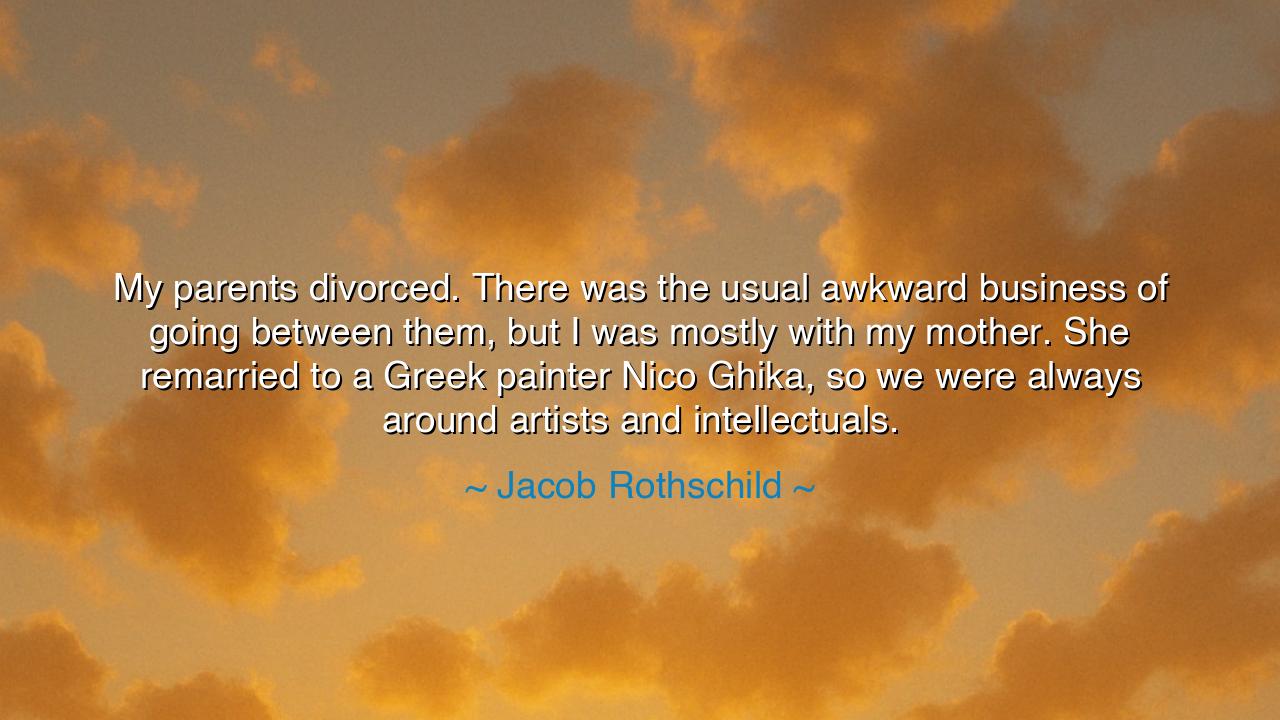
My parents divorced. There was the usual awkward business of
My parents divorced. There was the usual awkward business of going between them, but I was mostly with my mother. She remarried to a Greek painter Nico Ghika, so we were always around artists and intellectuals.






Host: The soft evening light filtered through the window, casting a calm glow over the room as Jack and Jeeny sat across from one another. Outside, the city’s usual rhythm continued, but inside, their conversation had shifted to something more personal, inspired by the words of Jacob Rothschild. The complexities of his upbringing, shaped by a divorce, a new marriage, and an environment filled with artists and intellectuals, made them reflect on the nature of identity, influence, and the impact of family dynamics.
Jack: “You know, Jacob Rothschild’s reflection on his childhood—his parents’ divorce, the awkwardness of navigating between them, and then being immersed in a world of artists and intellectuals—really highlights how much family dynamics shape who we become. It’s not just the experience of living through change, but the environment that gets created after, the people you’re surrounded by, and how those things mold your identity.”
Jeeny: “It’s fascinating, right? The way he talks about being raised around such a creative and intellectual crowd after his mother remarried. Even in the midst of a difficult personal transition, being surrounded by artists and thinkers likely gave him a unique lens through which to view the world. It’s not just about navigating the awkwardness of a divorce, but about how that new world of ideas and creativity influenced his perspective on life, on relationships, on success.”
Jack: “Yeah, it’s almost like the contrast between the personal struggle of the divorce and the world of intellectuals and artists created an environment where he was shaped by two different forces. One was rooted in family and emotional complexity, and the other was about ideas, art, and culture. I wonder how that balance between the personal and the intellectual affected him, how much that environment influenced his views on family, success, or even his approach to life decisions.”
Jeeny: “That’s the thing, isn’t it? The blending of the emotional and the intellectual can create a very layered perspective on life. On the one hand, the awkwardness and complexity of a broken family might have shaped his understanding of relationships, conflict, and loyalty. On the other hand, being surrounded by artists and intellectuals must have expanded his worldview, challenging him to think beyond the personal and consider broader ideas about society, identity, and culture.”
Jack: “Do you think that environment gave him a sense of groundedness, though? I mean, with such contrasting forces at play, I wonder how someone can find a sense of balance between the emotional and intellectual sides of their identity. Could he have felt torn between the pull of family relationships and the intellectual ideals he was surrounded by?”
Jeeny: “I think that’s the crux of it—balance. For someone like him, who grew up navigating family complexities while also being immersed in a world of ideas, it’s likely that he was always trying to reconcile these different parts of himself. The intellectual world may have offered a sense of escape or a framework to understand his personal struggles, but the emotional side, rooted in his family experiences, would have grounded him in the realities of human connection. Maybe it wasn’t about choosing one over the other but finding a way to let them coexist and influence one another.”
Jack: “That makes sense. In a way, his upbringing was a collision of realities—the challenges of family and the creative energy of a world filled with artists. Those early experiences would have shaped how he saw the world, how he navigated relationships, and how he defined success and personal fulfillment. I guess that’s the impact of being raised around such a diverse and complex environment. It’s not just about learning from the world of intellectuals, but about how you process those lessons through the personal lens of your own experiences.”
Jeeny: “And that’s what makes his story so interesting—he wasn’t just influenced by the intellectual and creative environment, but by the human experiences of his family, too. There’s this duality in his life, this balance between personal and intellectual, emotional and creative, that likely gave him a very nuanced understanding of the world. His journey was shaped not just by what he learned, but by how he experienced those lessons.”
Host: The city outside continues to move, but inside, Jack and Jeeny sit in quiet reflection, contemplating how family dynamics and the environment we are raised in shape our identities. Jacob Rothschild’s words serve as a reminder that the journey through personal struggles, intellectual exploration, and the blending of these forces is what creates the richness of who we become. The experiences, the people, the challenges—they all converge to form a complex, ever-evolving sense of self.






AAdministratorAdministrator
Welcome, honored guests. Please leave a comment, we will respond soon